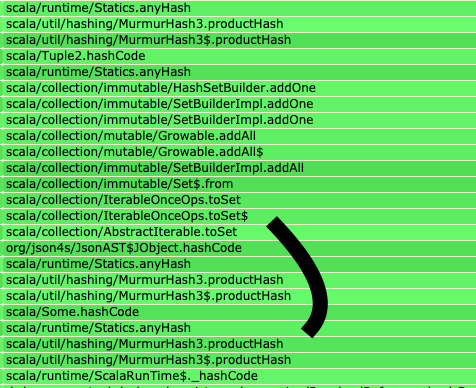Hash codes can be surprising
I'd like to write about a performance issue I found out on production.
This issue is coming from change to a Scala function. That change looked totally innocent at the first place.
The code in question is about fetching JSON object from external resources.
The function accepts ids as input and returns a Map where the value is an Option[JObject] to represent, for each id if a JSON object could be found or not.
I'll try to explain this with some code. I simplified the original code a lot to focus on the important port.
First some code just to fake the data structures used later:
case class Id(value: String)
// just to represent a JSON object
case class JObject(fields: List[(String, Any)])
def loadFromExternalServer(id: Id): Option[JObject] =
if (id.value.hashCode() % 2 == 0) // simulate finding the external resource or not
None
else
Some(JObject(List("id" -> id.value, "name" -> "a name")))
The initial implementation
The function was initially implemented like this:
def loadRecords(ids: Seq[Id]): Map[Id, Option[JObject]] =
ids
.map(id => (id, loadFromExternalServer(id)))
.toMap
If we call this function, we will get the expected Map:
val ids = Seq(Id("id-1"), Id("id-2"), Id("id-3"), Id("id-4"), Id("id-5"))
loadRecords(ids)
// Map(Id(id-1) -> Some(JObject(List((id,id-1), (name,a name)))), Id(id-5) -> Some(JObject(List((id,id-5), (name,a name)))), Id(id-4) -> None, Id(id-3) -> Some(JObject(List((id,id-3), (name,a name)))), Id(id-2) -> None)
The change
At some point, one notices that we sometimes are calling loadRecords with duplicated ids. To avoid that, we changed the Seq to a Set to make sure that all ids are unique:
def loadRecords(ids: Set[Id]): Map[Id, Option[JObject]] =
ids
.map(id => (id, loadFromExternalServer(id)))
.toMap
As you can notice, we only changed ids: Seq[Id] to ids: Set[Id] in the function signature.
The result of calling this function does not change:
val ids = Set(Id("id-1"), Id("id-2"), Id("id-3"), Id("id-4"), Id("id-5"))
loadRecords(ids)
// Map(Id(id-1) -> Some(JObject(List((id,id-1), (name,a name)))), Id(id-5) -> Some(JObject(List((id,id-5), (name,a name)))), Id(id-4) -> None, Id(id-3) -> Some(JObject(List((id,id-3), (name,a name)))), Id(id-2) -> None)
The impact
When looking at the servers on production, I found a strange part in one flame graph:

The servers were spending a significant amount of time computing the hash codes of JSON objects.
The explanation
It took me some time to figure out the issue.
Let's focus on this part:
ids
.map(id => (id, loadFromExternalServer(id)))
This piece of code produced a Seq[(Id, Option[JObject])] before the change.
After the change, it produces a Set[(Id, Option[JObject])].
For every item inserted, a Set must check for duplicates. It does that with the help of the hash code of each element.
After the change, Set was also asking for the hashCode() of the JObject, computed recursively by traversing the whole JSON object. For large objects, this computation can be costly. (At least, costly enough to make it apparent in a flame graph)
This change went unnoticed because the hashCode() method exists on all objects in Java.
If we had used type classes, we may have noticed this issue before. By assuming that there is no instance of def hashCode(): Int for JObject (which seems fair), the compiler would have fail.
Avoiding intermediate collections
To avoid computing intermediate collections, we can also use the iterator():
def loadRecords(ids: Set[Id]): Map[Id, Option[JObject]] =
ids
.iterator
.map(id => (id, loadFromExternalServer(id)))
.toMap
That way, we avoid instantiating the intermediate Seq or Set.